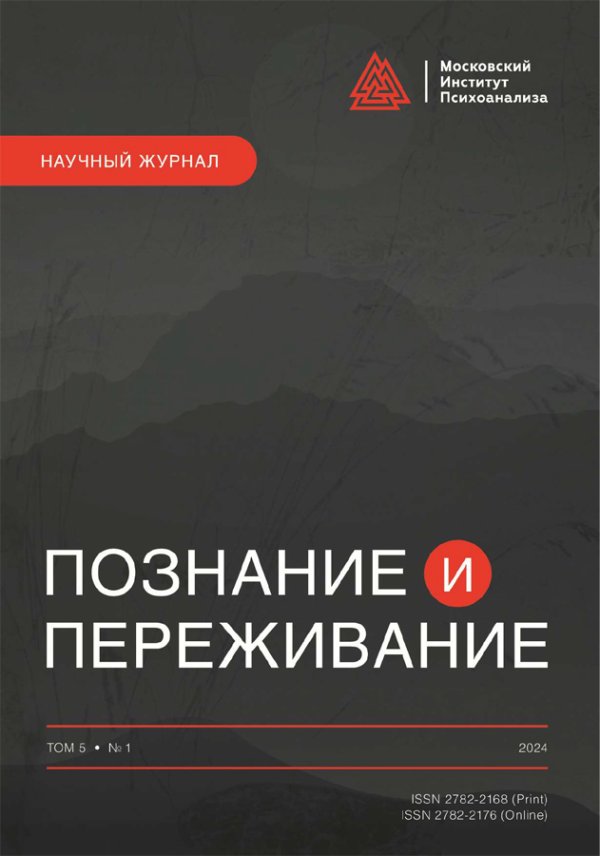Cognition and experience
ISSN (print): 2782-2168, ISSN (online): 2782-2176
Founder: Moscow Institute of Psychoanalysis
Editor-in-Chief: Barabanshchikov Vladimir Aleksandrovich, Doctor of Psychology. Sciences, Professor, Corresponding Member of RAO
Frequency / Access: 4 issues per year / open
Included in: Higher Attestation Commission List, RISC
The scientific journal "Cognition and Experience" was founded in 2020 with the participation of researchers from leading educational and scientific organizations in Moscow in the field of psychological science and practice.
The founder and publisher of the periodical "Cognition and Experience" is Moscow Institute of Psychoanalysis.
The main purpose of the journal is to publish scientific research and practical developments carried out at the junction of various branches of psychology and related specialties - general and social psychology, developmental and educational psychology, medical psychology, psychological counseling, psychoanalysis and psychotherapy, and affecting such mental phenomena as cognition, experience, behavior, communication, activity, personality, etc.
The main sections of the journal:
- "Fundamentals of Psychology" (theory and methodology, cognitive psychology, personality psychology, psychology of states, psychology and psychophysiology of activity);
- "Psychology in the context of practice" (psychology of professional activity, psychology and society, psychology and medicine, psychology and education, psychology and culture);
- "Experiment in Psychology" (methodology of experimental research, instrumentation, special methods and procedures, empirical concepts of psychology);
- "Innovative technologies and methods" (the use of digital technologies for solving research and practical problems);
- "Analytical notes" (publications of psychoanalytic materials, analysis of individual cases, psychotherapeutic techniques, etc.);
- "Psychological practicum" (publication of tests, teaching materials and programs, competition works of students and graduate students);
- "Events, facts, memorable dates" (information about events of scientific and / or public importance, including conferences, congresses, anniversaries of famous scientists and practitioners, etc.).
The journal is distributed both in electronic and printed versions. The periodicity of the journal is 4 issues per year. All submitted materials are reviewed by members of the editorial board and attracted specialists
All materials of the publication are freely available on the magazine's website at: www.inpsycho.ru.
Reproduction of materials is prohibited without the permission of the publisher, materials published in the journal are allowed to be used only for personal non-commercial purposes. When citing materials from the journal "Cognition and Experience", reference to the original source is required.
Mass media registration certificate:
The printed and electronic periodicals of the magazine "Cognition and Experience" are registered by the Federal Service for Supervision in the Sphere of Communications, Information Technologies and Mass Communications in accordance with the Law of the Russian Federation on the Mass Media.
Mass media registration certificate: PI No. FS77-78205 dated 03/20/2020
Current Issue
Vol 5, No 1 (2024)
Psychology of personality
Features of coping behavior of military university cadets with different levels of academic performance
Abstract
This article presents the results of a study of the relationship between the academic performance of military university cadets and the coping strategies they implement. It was found that strategies of coping behavior based on building interaction with other people, rational planning for solving difficulties and a positive attitude towards them allow cadets to achieve high academic performance. The results obtained made it possible to describe the features of the coping behavior of cadets, contributing to and hindering high academic performance.
 7-17
7-17


Individual peculiarities of perception of cyberbullying situations
Abstract
The article examines individual characteristics of the perception of cyberbullying. The main theoretical aspects of cyberbullying are covered: the specifics of cyberbullying, personal characteristics and predictors of cyberbullying. The results of a theoretical and empirical study of people’s perception of cyberbullying situations taking into account their personal characteristics are presented. The focus of the study was on the problem of revealing the specifics of the perception of cyberbullying by adults. It has been shown that socio-demographic char acteristics such as gender, age and individual characteristics such as: experience of cyberbullying, presence of traumatic experience in the past, level of cognitive and affective empathy influence the perception of cyberbullying situations. The main findings of the study showed that men and women may have different perceptions of cyberbullying situations, with age, experience of cyberbullying and level of empathy also having a significant impact on differences in perception of such situations.
 18-43
18-43


Philosophy and psychology
Returning to the philosophers’ polemic about deafblindness (arguments from the «limited liability methodology»)
Abstract
The article examines the polemic of two well-known Russian philosophers concerning the factors determining human development, as well as the reasons for E.D. Ilyenkov’s falsification of the real conditions of the Zagorsky Experiment. If Ilyenkov argued that the formation of personality depends solely on social conditions and means, then D.I. Dubrovsky insisted that genetic factors also play an essential role in this process, which must be taken into account in solving problems of upbringing and education. In addition to the causes of falsification, we are talking about an old psychophysiological problem, however, in its modern form ‒ the relationship between the psyche and the brain, as well as the influence of genetic factors on the formation of an individual. The Zagorsky experiment is compared with an experiment on the domestication of wild animals, which was carried out around this time by geneticist Dmitry Belyaev, and the similarities and differences between these experiments are noted. The author sets the task to analyze the relationship of the psyche and physicality more thoroughly, for which he outlines the stages of the genesis of human formation. He shows that the need to adapt to communication, work with signs and tools, and act together transform the biological substance of hominids, creating on its basis, on the one hand, the human psyche, on the other ‒ the «an- thropobiological organization» of his physicality. These sides are connected by the principle of «psychosomatic unity», according to which every mental process requires its own somatic (physiological) provision (support) and vice versa. In the last part of the article, based on the theoretical concepts obtained, arguments are put forward in support of Dubrovsky’s position. The strategy of bringing the deafblind into the world of normal life and creativity is compared with the strategy of psychotherapist Pavel Volkov, which allows clients to withdraw from the world of schizophrenia.
 44-60
44-60


Logo marathon
Formation of the noetic dimension in children through children’s literature
Abstract
The article discusses the principles of logotherapy through the analysis of children’s literature. It traces how certain aspects of the theory of logotherapy are described, and their further discussion with children. Children are a category of clients in logotherapy in whom the spiritual (noetic) dimension is not developed, because their personality is still being formed. Literature can become a source of information, a model of how to act and what to do, through which a child can learn about the world around him, as well as form his idea of himself and his capabilities. The given examples from children’s works allow adults to discuss with children such categories as fate-freedom, choice, decision-making, love, loss, values of creation, contemplation and relationships. As a result of the analysis of the literature, we can conclude that a child experiences the same events, circumstances and feelings in his life as an adult. Discussing experiences from books and life in the future will help the child to be more aware, open to the world and be prepared for various circumstances that he may encounter. Thanks to the plots and stories that authors describe in books for children, adults have the opportunity to discuss them with the child, thereby forming a conscious personality that will act from its noetic dimension
 61-70
61-70


Psychoanalytic portal
About the psychodynamics of attraction cohesion-separation
Abstract
Author proposes to consider the processes of large group conflict in the paradigm of biologically programmed drive, which he calls the cohesive-divisive drive. This drive governs the mechanisms responsible for group cohesiveness, disintegration and enmity between groups. In a mental life of an individual, various manifestations of cohesive-divisive drive can be clearly observed as behavioral, cognitive, and emotional reactions. In psychoanalytic setting, the change from the polarity of cohesiveness to the polarity of divisiveness is manifested by freezing, loss of empathy, narrowing of consciousness, and restricted thinking in both participants. Author describes in detail the corresponding psychodynamics. Based on the data of neurophysiology and socioanthropology, he suggests that the biopsychological substrate of a cohesive pole is based on a mechanism of early attachment, while the divisive pole is rooted in mechanisms of aggression, specifically cold aggression. Author epistemologically unites these opposite trends of human activity into one drive, since only taken together they reflect “rational” (teleological) purpose – the selection of groups in the process of Evolution. At the same time, the choice of an overtly anthropocentric standpoint provides clear ethical basis to the epistemology of instincts, which must be both scientific and human at the same time.
 71-84
71-84


Analytical notes
Аbout the compensatory function of fantasy
Abstract
In the note, the author proposes a theoretical understanding of the compensatory function of fantasizing as a mechanism for protecting the subject’s True Self from neuroticism and maladaptation due to psychotrauma from the perspective of the phenomenon of posttraumatic personality growth.
 85-97
85-97












